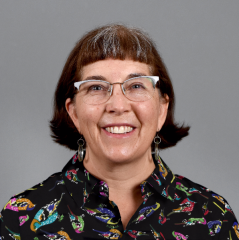Shauna BurnSilver
Shauna BurnSilver is an environmental anthropologist interested in how changes in the global climate and economic dynamics are affecting relationships between people and the environments they depend on.
At the core of her work is an examination of social processes, particularly the role of social relationships embedded in networks, which shape households, communities and diverse stakeholder responses to change, in turn affecting livelihoods, well-being and institutional frameworks. BurnSilver poses theoretical questions from within Environmental Anthropology, but the majority of her work is interdisciplinary and collaborative, an approach that allows exploration of change dynamics at a range of scales - small and large - critical for addressing complex questions of persistence, vulnerability and resilience within social-ecological systems.
The perspective that social cohesion matters, and social relationships are a means by which critical resources and information flow between people and organizations is a thread uniting BurnSilver’s early work with Maasai pastoralists in Kenya, as well as current collaborations with Arctic communities and policy makers in Alaska and Russia, and utility assistance providers in Urban Phoenix. In each case social relationships are integral to understanding processes of human-environmental decision-making – for example, how people responded to land tenure transformations (Kenya), the persistence of Arctic mixed economies even as economic conditions change (Alaska), climate change effects on community and international policy networks (Berengia), and the effect of rising temperatures on utility assistance provision for vulnerable groups (Phoenix).
A second theme linking BurnSilver’s work is human connections to place, and through this lens, the livelihoods pursued in diverse places. How do different groups describe relationships with their land and resources, Nature (writ large) and the environment? Do these cultural understandings shape social relationships and human-environment decisions in the short and long terms, and if so - how? This work engages with narratives of "progress", "well-being" and “vulnerability” in the midst of changes.
Strong collaborations with communities and diverse stakeholders are the foundation of all BurnSilver’s work and research. Methodologically, she combines qualitative and quantitative methodologies, leveraging the strengths of ethnography and quantitative survey research and incorporating unique insights gained from network analysis, traditional ecological knowledge, collaborative science, and agent-based and social-ecological modeling to understand patterns of change - and their implications for people and landscapes now and into the future.
Ph.D. Human Ecology, Graduate Degree Program in Ecology, Colorado State University
M.S. Resource Interpretation, Colorado State Univerity
B.A. International Relations, Scripps College
Baggio, J. A., S. B. BurnSilver, S. B., A. Arenas, J.S. Magdanz, G.P. Kofinas, and M. De Domenico (2016). Multiplex social ecological network analysis reveals how social changes affect community robustness more than resource depletion. Proceedings of the National Academy of Sciences, 113(48), 13708-13713.
Brinkman, T., W. Hansen*, F.S. Chapin III, G. Kofinas, S. BurnSilver, and T.S. Rupp (2016). Arctic communities perceive climate impacts on access as a critical challenge to availability of subsistence resources. Climatic Change 139 (3):413-427.
Petrov, A., S.B. BurnSilver, F.S. Chapin III, G. Fondahl, J. Graybill, K. Keil, A. Nilsson, R. Riedlsperger* and P. Schweitzer. Arctic sustainability research: toward a new agenda (2016). Polar Geography. Aug:165-178. http://www.tandfonline.com/doi/full/10.1080/1088937X.2016.1217095
BurnSilver, S. B., J. Magdanz, R. Stotts*, M. Berman and G. Kofinas (2016). Are Mixed Economies Persistent or Transitional? Evidence using social networks from Arctic Alaska. American Anthropologist. 118(1):121-129.
BurnSilver, S.B. (2016). Representing Wealth in a Changing Pastoral Economy: A comparison of traditional and new metrics in Maasailand, Kenya. Nomadic Peoples. 20(1):8-34.
Galvin, K.A., T. Beeton*, R. Boone, and S. B. BurnSilver (2015). Health and Nutritional Status of Maasai Pastoralists under Change. Human Ecology 43(3):411-424. http://link.springer.com/article/10.1007/s10745-015-9749 x?wt_mc=email.event.1.SEM.ArticleAuthorOnlineFirst
Risvoll, C.*, G. Fedreheim, A. Sandberg and S. BurnSilver (2014). Does Pastoralists' Participation in the Management of National Parks in Northern Norway Contribute to Adaptive Governance? Ecology and Society 19(2): 71. [online] URL: http://www.ecologyandsociety.org/vol19/iss2/art71/
R. Biggs, M. Schlüter, D. Biggs, E.L. Bohensky, S.B. BurnSilver, G. Cundill, V. Dakos, T.M. Daw, L.S. Evans, K. Kotschy, A. Leitch, C. Meek, A. Quinlan, C. Raudsepp-Hearne, M.D. Robards, M.L. Schoon, L. Schultz, P.C. West (2011). Toward Principles for Enhancing the Resilience of Ecosystem Services. Annual Review of Environment and Resources. 37:421-448.
Boone, R. B., K. A. Galvin, S. B. BurnSilver, P. K. Thornton, D. S. Ojima, and J.R. Jawson (2011). Using coupled simulation models to link pastoral decision making and ecosystem services. Ecology and Society, 16(2), 6.
Kofinas G.P., F.S. Chapin III, S.B. BurnSilver, K. Kielland, J. Schmidt and A. Springsteen (2010) Resilience in the face of Climate Change: Forests, Fire, Moose Hunting, and Subsistence in Interior Alaska. Canadian Journal of Forest Research. 40(7): 1347-1359.
Reid, R.S., D. Nkadienye, M. Y. Said, D. Kaelo, M. Neselle, O. Makui, L. Onetu, S. Kiruswa, N. Ole Kamuaro, P. Kristjanson, J. Ogutu, S.B. BurnSilver, M. J. Goldman, R. B. Boone, K. A. Galvin, N. M. Dickson, and W. C. Clark (2009). Knowledge Systems for Sustainable Development Special Feature Sackler Colloquium. Evolution of models to support communities and policy action with science: Balancing pastoral livelihoods and wildlife conservation in savannas of East Africa. Proceedings of the National Academy of Sciences (PNAS). 113(17):4579-4584. www.pnas.org_cgi_doi_10.1073_pnas.0900313106
Boone, R. B., S. B. BurnSilver, J. S. Worden, K. A. Galvin, and N.T. Hobbs (2008). Large-Scale Movements of Large Herbivores Livestock following changes in seasonal forage supply. Resource Ecology, 187-206.
Thornton, P.K., R.B. Boone, K.A. Galvin, S.B. BurnSilver, M.M. Waithaka, J. Kuyiah, S. Karanja, E. González-Estrada and M. Herrero (2007). Coping strategies in livestock-dependent households in East and southern Africa: a synthesis of four case studies. Human Ecology 35(4): 461-476. 20%
Christensen L., S.B. BurnSilver and M. Coughenour. (2006). Integrated Assessment of the Dynamics, Stability and Resilience of Inner Mongolian Grazing Ecosystems. Nomadic Peoples. 9.1: 131-146.
Thornton, P.K., S.B. BurnSilver, R.B. Boone, and K.A. Galvin (2006). Modeling the impacts of group ranch subdivision on agro-pastoral households in Kajiado, Kenya. Agricultural Systems. 87:331-356.
Boone, R.B., S.B. BurnSilver, P.K. Thornton, J.S. Worden, and K.A. Galvin. (2005). Quantifying declines in livestock due to land subdivision. Rangeland Ecology & Management. 58:523-532.
Sociocultural Anthropology
Environmental Social Science
Sustainability
Networks
Global Development
